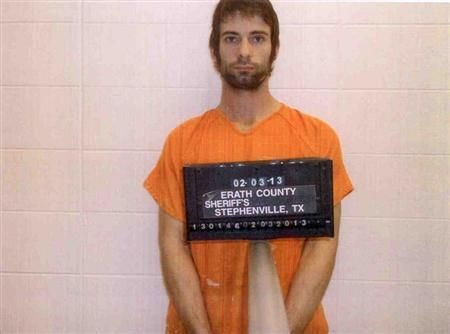Questions Remain Over PTSD's Involvement In Dorner Manhunt, Chris Kyle Killing

Post-traumatic stress disorder has become an underlying theme in the case of Chris Kyle’s killing and now, perhaps more subliminally, in the manhunt for Christopher Dorner, the former naval reservist and LAPD officer who is accused of killing three people. While doctors and psychologists have traditionally been slow to understand the full ramifications of PTSD, it is clear that the disease, while prevalent throughout history, is affecting more veterans than ever. And the consequences couldn’t be more serious.
Chris Kyle served four tours of duty in Iraq as a military sniper. In his best-selling book “American Sniper” he estimated that he killed more than 150 insurgents, a quality that earned him the nickname “Devil of Ramandi” among enemy forces. But the 38-year-old Kyle knew that mental trauma was a major problem in the military so, using the profits from his book, he set up a charity devoted to helping veterans afflicted with PTSD.
Enter Eddie Ray Routh. Routh had been deployed to Haiti as a member of the Marines, but when he returned home his mother got in touch with Kyle to help her son, who she thought was struggling with flashbacks, fear, and sudden anger, all symptoms of PTSD. Kyle, along with his friend Chad Littlefield, brought Routh to a private shooting range in central Texas, where police say Routh snapped, fatally shooting both men.
That same weekend, across the country in Irvine, Calif., police found college basketball coach Monica Quan and her fiancé dead, shot while sitting in their parked car in a ramp not far from their home. The prime suspect was Christopher Dorner, a former member of the LAPD who had been fired from the department after complaining about a white female officer who was his superior. Quan’s father had represented Dorner during the proceedings that ultimately led to his dismissal.
Dorner, who is now the subject of a search in that’s stretched from California, surrounding states, and into Mexico, has also been accused of killing an LAPD officer who was waiting at a red light. Before going on the lam Dorner published a rambling 14-page manifesto, accusing the department of racism and the courts of wrongfully revoking his status in the Navy, where he served overseas and was a decorated marksman.
The severity around each crime combined with the amount of publicity in the national media has naturally led to questions about exactly how PTSD may have contributed and if the loss of life could have been avoided.
Symptoms of the disease include intrusive memories about a disturbing event in one’s life, leading to flashbacks that can last for minutes or weeks at a time. Survivors have reported screaming fits they don’t remember hours later and spontaneous violent outbursts at sounds that are reminiscent of the theater of war. The anguish also wears on the loved ones of a veteran.
“Trauma is really not something that happens to an individual,” Robert Motta, a clinical psychologist and psychology professor at Hofstra University, told Mac McLelland, who wrote one of the definitive articles on the subject for Mother Jones. “Trauma is a contagious disease; it affects everyone that has close contact with a traumatized person.”
About 9 percent of average Americans suffer from PTSD, while nearly 30 percent of combat veterans are afflicted.
All of which leads to the question about what can be done. While Routh and his family have said he’s struggled with the invisible disease, Dorner may not be motivated by PTSD. He was never treated for psychological problems during his time in the military and passed the mental tests to gain entry to the LAPD, which includes a PTSD evaluation.
“Once it's been reported that you have been treated in the military for PTSD, in many cases you are screened out as an applicant," Valvincent Reyes, military liaison at the Del Amo Military and Veterans Programs in Torrance, Calif., told the San Gabriel Valley Tribune.
“The California Highway Patrol conducts training for officers who return from combat, and they are training police agencies to help officers on the street with their psychological needs.”
Still, experts who read his manifesto and heard accounts of Dorner's glazed-out stare pointed to mental trauma, whether real or perceived, as possible indication of his motive.
Hopefully the stigma will continue to fade and open up more treatment options for former soldiers, before it’s too late.
© Copyright IBTimes 2024. All rights reserved.











